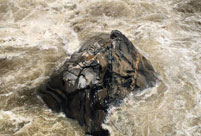 Luoyang aims to become 'Chinese Culture City'
Luoyang aims to become 'Chinese Culture City'
 Century-old jade disc found confirms ancient legend
Century-old jade disc found confirms ancient legend
 A serious mind behind Chinese leader
A serious mind behind Chinese leader
 Panda Cubs to Predict 2014 World Cup Winners
Panda Cubs to Predict 2014 World Cup Winners
 China Southern Airlines flight attendants win titles in service contest
China Southern Airlines flight attendants win titles in service contest
 Pupil's performance art persuades people to stop smoking
Pupil's performance art persuades people to stop smoking
 Nie Chenxi's clay tigers
Nie Chenxi's clay tigers
 Children's Day wishes
Children's Day wishes
 Chinese Kung Fu charms Silicon Valley
Chinese Kung Fu charms Silicon Valley
 Tranquil Yankou ancient town
Tranquil Yankou ancient town
American defense secretary Chuck Hagel delivered a speech at the Shangri-La Defense Dialogue in Singapore on May 31st. In addition to defending America's pivot to the Asia-Pacific region, he also declared that the Diaoyu islands fall under the mutual defense treaty with Japan and voiced support for Japan's right to collective self-defense. Moreover, he placed emphasis on his criticism of China and made use of many threatening words.
In response to this irresponsible speech, the deputy chief of the General Staff of the Chinese People's Liberation Army Wang Guanzhong pointed out that Hagel's speech was filled with terms that will incite unrest in Asia. China had not foreseen that Hagel would deliver such an offensive speech. His accusations against China were unreasonable.
In order to maintain its hegemony and enjoy an economic dividend from the rapid development of Asia, America has devised a series of new Asia-Pacific strategies such as “Back to Asia”, “Pivot to Asia” and “U.S. Asia-Pacific Re-balance Strategy” to expand its military presence in Asia. America's so called “U.S. Asia-Pacific Re-balance Strategy” has increasingly aroused concern and anger among many of the countries affected on the one hand, and become the butt of criticism of influential strategists at home. We find ourselves in total disagreement with Hagel's groundless accusations - he would do well to subject himself to similar critical analysis.
As is widely accepted, the Diaoyu Islands, Xisha, Zhongsha and the Nansha islands have formed an integral part of China's territory since ancient times - there is no shortage of historical and legal evidence to support China's claims. China has nevertheless shown great restraint and patience in its calls for regional peace and stability, even when confronted with unreasonable demands and provocation on the part of other countries. China has exercised military restraint over the issues concerning the Diaoyu Islands, Huangyan Island and even the Xisha islands. Meanwhile, Japan's 'Self-Defense Force' jets have incessantly intruded into the East China Sea, far from the Diaoyu Islands to harass and threaten unarmed Chinese patrol aircraft.
Ships of the Philippine navy have harassed and threatened defenseless Chinese fishermen. Armed Vietnamese vessels have deliberately collided with Chinese government ships and fishing boats. China has never yet drilled a single oil well in the South China Sea, while countries such as Vietnam and Philippines have long been producing oil and gas in the area. We are curious about Hagel's motives in directing his accusations against China, while ignoring the efforts and sacrifices made by China in the interests of regional peace and stability.
Hagel's criticism of China as a 'rule-breaker' is a typical example of the hypocrisy of American politicians. The United Nations Convention on the Law of the Sea has met with approval from more than 150 countries since it was passed some thirty years ago. In pursuit of its own interests America, the self-styled “world policeman” and “supreme power” did not join the convention. With its own history of double standards, America has no business agitating for international laws and rules and attacking other countries for not abiding by these international rules.
China is no longer the downtrodden victim that it may have been one hundred years ago. China has no intention of stirring up trouble, but it will not sacrifice core national interests. Even in the face of provocation from Japan, the Philippines, and Vietnam, China remains tolerant and insists on peaceful settlement of disputes through bilateral negotiations. However, China is still forced to take counter-measures.
We hope the nations involved do not interpret our tolerance as a sign of weakness. We hope they will turn back to the path of solving disputes through negotiation. Moreover, we also wish that America would abide by its promise of not taking sides in sovereignty disputes in Asia. In this way regional peace and stability and the long-term interests of nations in the region can be secured.
The countries mentioned above would be considerably less presumptuous without the support of America. In this sense, America is the chief instigator of unrest in Asia. America's insistence on its policy of hegemony offers nothing to Asian security and serves only to fuel disorder.
The article is edited and translated from《美國(guó)霸權(quán)帶不來(lái)亞洲安全》, source: People's Daily Overseas Edition, author: Zhang Junshe, a researcher with the Navy Military Academic Research Institute.
 Magnificent Hutiao Gorge
Magnificent Hutiao Gorge  Heat waves hit China
Heat waves hit China Love at the construction site
Love at the construction site Graduation photos bring memories back to life
Graduation photos bring memories back to life Art school students present works in Nanjing
Art school students present works in Nanjing Xinjiang's first high-speed railway goes on trial run
Xinjiang's first high-speed railway goes on trial run 3D Sea-life Themed Art Garage unveiled in Zhengzhou
3D Sea-life Themed Art Garage unveiled in Zhengzhou
 Creative Photos go viral during graduation season
Creative Photos go viral during graduation season Students in last-minute effort for Gaokao
Students in last-minute effort for Gaokao Dali, an ideal summer vacation destination
Dali, an ideal summer vacation destination Xichan Temple's little monk hit the Internet
Xichan Temple's little monk hit the Internet Monologue of a modern dancer
Monologue of a modern dancer College girl proposes to boyfriend on Weibo
College girl proposes to boyfriend on Weibo Special operation members in counter-terrorism training
Special operation members in counter-terrorism training American football brings manhood out of boys
American football brings manhood out of boysDay|Week|Month